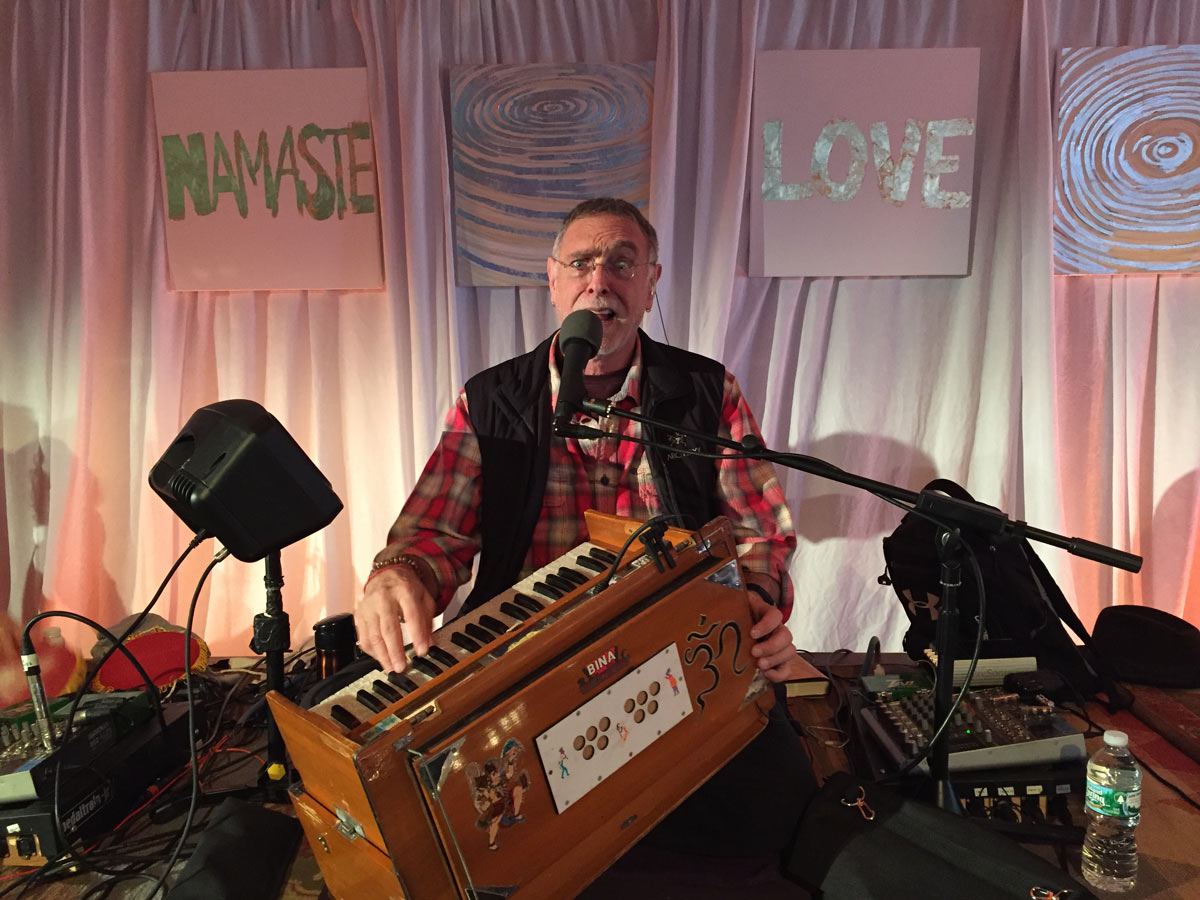
Podcast: Play in new window | Download
Subscribe: Apple Podcasts | Spotify | Amazon Music | Email | RSS
Call and Response Ep. 43 | Practice Arising By Itself, Dharmageddon and Does the Curriculum Change With Age
Question: I’m just finding it to be that I don’t have to try so hard because it just happens and what I like about that, it seems like it took a long time to get there. It gets better and it seems like it’s just easy. You just fall into it. Why all the struggles?
“Let’s say you’re home when that happens, you’re just sitting around and you remember the Name, for instance, or the Name shows up in your head. If you’re home, you could, you could go with it for a few minutes, right? You could allow it to surface, really surface.” – Krishna Das
Q: I’m finding out that the older I get, not old, whatever, that the practice comes by itself a lot of times. You’re thinking about it then all of a sudden.
KD: Sure.
Q: And I’m just finding it to be I don’t have to try so hard because it just happens and what I like about that, it seems like it took a long time to get there. It gets better and it seems like its just easy. You just fall into it. Why all the struggles? Oh, I don’t want to do that, it’s too hard. Now its so easy or easier.
KD: That’s good, but you know, so tell me about your experience. Give him back the mic.
Q: Well…
KD: What are you exactly referring to?
Q: Well, it’s just the whole practice in general, I guess.
KD: Meaning?
Q: Just like that? Oh, god.
KD: Like, for instance, a lot of times, the mantra will come back to me during the day and kind of, I’ll recognize that it’s there when I had forgotten, right? I’ve been just driving around or something and then I’ll hear, in a sense, in my head, the mantra, so that comes back to you. Sure. But what do you do at that moment?
Q: Seems to me I try to keep going with it. Yeah.
KD: Right. That’s it. Sure. But, that’s all good. No question about it. But there’s so many levels of sleep, so to speak. There’s so much time we spend asleep. The idea is to kind of gradually shorten the amount of time it takes for us to remember the mantra, for instance, right? And the way that happens, the way that is shortened is by willfully, using our personal will to bring ourselves back. But even, that’s an interesting thing, because ok, so you’re chanting, right? And then you notice you haven’t been paying attention and then you come back to the chant. How did you notice? Ha. You just do. It happens by itself. But we know that nothing happens without a cause. There’s no effect without a cause and no cause that doesn’t have an effect that became a cause, so if you, all of a sudden, woke up, so to speak, and recognized that you hadn’t been paying attention, that waking up is a direct result of practice you’ve done in the past. Either this life or another life. Otherwise you would get born, you’d graduate from high school, you’d drink some beer, and then you’d die. And you’re not here for one moment of your life. How many people do we know? Most of them are in the supermarket when you go there. Look around. Nobody’s home. It’s unbelievable. It’s like, yeah, sure, swimming through, like, water and… so, there you are, singing, and you haven’t been paying attention and then you, you go, “Oh, ok.” And you come back. How did that happen? You didn’t do that. You weren’t here, you were in dreamland. How did it happen that you came back and noticed? Consciousness, you became aware and awareness is something that is always here but recognized more through practice, through remembering. That’s what practice is. Remembering. So, you sit down to remember. “I’m remembering. I’m remembering my breath. Breathing in. Breathing out. Breathing in. Breathing out. Oh, I’ve got to go to the store later. What am I supposed to buy? Did I write it down? I don’t think I wrote it down. Oh, ok. My breath.” That moment when we come back, that is, in itself, an effect of the cause of having done practice before. Already. For instance, none of you would be here if you didn’t have some interest in this. Where did that interest come from? Why are you here and the other 400,000, 400 million people in DC are off having a good time?
Because we have, we share a common interest in something, something that’s supposed to be here today, I don’t know if it is but whatever. Ok. Thank you. All right, five bucks. Everytime you…
See me afterwards.
All right, so is that good? Yeah. That’s practice but, if that’s fine for you, if you’re happy with that, if you’re at ease with that, fine. If you feel that you still spend a lot of time asleep and you’d like to, you know, wake up more, then try doing, you know, let’s say you’re home when that happens, you’re just sitting around and you remember the Name, for instance, or the Name shows up in your head. If you’re home, you could, you could go with it for a few minutes, right? You could allow it to surface, really surface. If you’re driving in your car, you’ve gotta keep your eyes on the road, but if it happens sometime where you’re free of, you know, things that you… then you can kind of sit with it and notice it. It’ll fade. Cause it always fades, cause that’s our karmas, too. And then you’ll be off doing something else and then it’ll happen again. But the more you recognize that and allow it to deepen or allow the awareness to rise, however you want to say about it, that will shorten those moments when you’re not present. Ok.
Q: I have a question about those having a guru and karma and I’ve been practicing with a Buddhist community for 20 years that’s kind of going through Dharmageddon right now, people are saying. What if your karma has led you to take samaya with a guru who’s…
KD: Why don’t you explain to people what “samaya” is.
Q: Vows. Lifelong, lifetimes of being connected to, of taking him as your teacher for lifetimes.
KD: In, she’s talking about Vajrayana Buddhism, Tibetan Buddhism. So, in Vajrayana, the Guru is treated as, almost like a deity. There’s nothing the Guru can do that isn’t purely motivated by compassion. That’s the ideal situation and when you take samaya it means you vow, you take a vow to see the Guru like that. And that anything they do is motivated only by pure intention and compassion, even if it doesn’t seem like that to you. It’s very, very advanced. It’s not for everyone. And it’s a very advanced situation. So, this young woman took this vow with a Guru who fucked up really bad. And hurt a lot of people and did a lot of terrible things. And there’s a whole thing going on in that community and a lot of different communities right now. And all I can say to you is, you have to listen to your heart as to what the right thing is to do. Don’t listen to anything other than your own feelings in this case, that you have every right to either leave the community or stay with the community or do whatever. It’s all completely and absolutely up to you. There should be no pressure you feel from the outside, because ultimately, they are just human like you are and this Guru came from a very particular lineage and there’s no way to understand why he did the things he did. No one can know another’s motivations, even though it’s pretty obvious that he was screwed up. But still, one can’t know. One can only trust one’s heart in any situation, whether you took a vow or didn’t take a vow. You took a vow because you trusted your heart. You can leave because you trust your heart. Nothing bad can come to you from the outside. That’s the deal.
Q: Thank you.
Q: So, thank you very much for being here. My question is about stages in life and the question is, does the curriculum always stay the same?
KD: Meaning what?
Q: Well, the question comes from actually thinking about this last book that Ram Das wrote with Mirabai Bush about preparing for death, and that death should be at the forefront of our awareness.
KD: Walking each other home?
Q: Yeah. And I guess I’m just wondering, you know, when one’s a kid, when one’s in their 20s, when one’s in their 30s, I mean does the curriculum, are there life stages and are there times in our lives where, I’ll put it this way, were there times in your life when the practice, you woke up and sort of said, “Wow, that’s the practice.” “Oh, no, that’s the practice.” “Oh, no, that’s the practice.” And are there times in our lives where, well, I guess, you know, I’ll leave it at that. Does the curriculum stay the same?
KD: Well, yes and no, you know? The curriculum is to wake up. And to find real love. That’s the curriculum as far as I’m concerned. And to live in that love 24 hours a day, or that space of presence or being or true nature, whatever you want to call it. It’s to be in that full-time. To recognize your true nature. To awaken. So that’s the curriculum that stays the same for somebody who’s interested in that. But you have different issues to deal with as you get older, as the body ages, as you mature emotionally, etcetera. But the curriculum stays the same. You just have other issues to deal with. And different things become, you know, when you’re sixteen, basically the curriculum is to wake up and get laid. When you’re eighty-six, the curriculum is to just wake up.
That was pretty good.
Wow.
So, yeah. You know, that’s like that. Some traditions have as their practice, meditation on death, from the beginning. And what that means to an eight year old is very different than what it means to somebody who’s actually eighty with the imminent, with the end of the physical body much more imminent and actually, you know, feeling it in the body. Then you start to think, “ok. Wow. You know, you wake up in the morning and stuff isn’t working like it worked the day before. “What happened, I didn’t do anything.” Yeah, you did. You got old. So the curriculum is the same, but the issues are ever changing. No? What do you think? That’s what I think. Was that reasonable or was it not?
Q: That was totally reasonable. Yeah. The situations change. Maybe I’m just, maybe what I’m really asking is, do the practices change?
KD: Aha.
Q: Do the practices in which one uses to approach the changing situations, do some make more sense than others. For example, just a quick, in teaching kids about Thoreau and Walden, they’re like “What is this stuff? I don’t want to be alone. I don’t want to be… solitude is the last thing that feels… I need.” When you get a little older, you go, “whoa, there’s something there.” So I guess the question may be more about practice than curriculum.
KD: I don’t know. Yeah it could change. I mean, in my situation it’s just a question of being able to give myself more fully to the practice I’m doing. That kind of seems to have deepened over the years. There’s less stuff pulling me out of the moment and I’m able to give myself more fully to whatever practice I’m doing and there are practices, you know, different traditions have different practices for learning how to die consciously, learning how to dream consciously, be aware in your dreams and stuff like that. A lot of practices out there that, I don’t know if they change necessarily with stages of life, I think they change as you change in your own life, too. But yeah, there’s all kinds of things and you might be led to other practices as time goes on because then they all of a sudden, they make more sense to you. You know, like, monks tend to do practices that teach them to be disgusted by the human body. So they don’t get attached to their own body or attracted to other bodies, to protect their vows. You know, they meditate on, you know, this bag of slime and shit and mucous that, that we carry around with us, that we think is so beautiful, you know? You know? So, that’s… they’ll really cultivate that so when they look out, they’ll see bags of slime and shit and mucous. They don’t see somebody they’d like to screw. But that’s a very particular practice for a very particular person who’s involved that way. Not for us. Although, as time goes on, you know, Tulsi Das, this great poet in Indian traditions, said “Oh Lord, save me from the fever of youth.” You know, the older you get you go like, “What was I thinking? Oh, I wasn’t thinking.” You know, it’s like being young is like, the hormones cruising through your blood and it’s like, the fever. Gobble gobble gobble gobble. You know, you get a little older, it’s like, can I just rest a little bit? No! Go grab more stuff. You know. So, things change. It’s all good.




Hello old Friend, Around 1974 in Colorado, Ram Das came for the opening of Naropa. He was mentoring me on my dissertation on meditation . I believe you were with us as we drove in his Van to my University in Greely. The Gym. was filled and RD spoke.
Music and chanting was happening behind him. No selfies then but we’ve found a few Pics. Fast forward 45+yrs, I continue my practice as a psychologist and sitting. Joesph G.also was there with RD. It was his first experience teaching a large group.
I always have music in my head. Your memory came to me as I thought about changing the tune. See you somewhere.
Marc